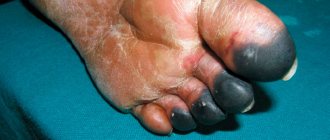The smell of acetone on your breath - does diet matter?
The content of the article
An acetone odor from the breath is felt in people on a low-sugar diet. A decrease in the concentration of carbohydrates leads to the fact that the main source of energy for the body becomes fats, which form ketone bodies. Fats will also be the main source of energy received by the body in case of fasting and a small supply of sugars.
Symptoms of elevated ketone levels due to the ketogenic diet:
- Smell of acetone from the mouth.
An increased concentration of ketones is indicated by a noticeable smell of sour apples from the mouth. - Decreased activity
. Reducing the intake of carbohydrates initially leads to a feeling of constant fatigue, dizziness and nausea. Physical strength also decreases. This state lasts for several days or weeks until the body begins to burn more fat and switches to a new source of energy. - Disruption of the gastrointestinal tract
. The ketogenic diet can also lead to diarrhea and constipation. - Insomnia.
Sleep disturbances are a kind of signal from the body about carbohydrate deficiency. - Decreased appetite.
Patients begin to lose weight and appetite. This is due to the fact that a decrease in the concentration of carbohydrates in the blood leads to a decrease in the concentration of insulin and an increase in glucagon, which stimulates the oxidation of fatty acids. Increased protein degradation when using this diet can lead to negative consequences due to protein deficiency.
A low-carbohydrate, low-fat diet that leads to ketosis has long been used to treat epilepsy, especially in children.
How is acetone formed in the human body?
The bulk of energy in the body comes from glucose . The blood carries glucose throughout the body, and thus it enters all tissues and cells. But if there is not enough glucose, or there are reasons that prevent it from entering the cells, the body looks for other sources of energy. Typically these are fats. After their breakdown occurs, various substances, including acetone, enter the bloodstream. It is with this process that the causes of acetone in the blood in adults and children are associated.
After this substance appears in the blood, the kidneys and lungs begin to secrete it. Consequently, the test for acetone in the urine becomes positive, a strong smell of urine is felt, and the air that a person exhales gives off the aroma of pickled apples - a characteristic aroma of acetone or the smell of vinegar from the mouth appears.
The main reasons for the appearance of a characteristic odor:
- fasting , dieting, severe dehydration;
- hypoglycemia in patients with diabetes mellitus ;
- kidney and liver diseases;
- thyroid diseases;
- predisposition to acetonemia in children.
Let's consider the listed reasons in more detail.
Starvation
Sometimes it seems that in the modern world almost everyone goes on diets from time to time - both women and men. Some people practice even more extreme methods to get rid of extra pounds by practicing fasting. It is by adhering to diets that have nothing to do with medical indications or doctor’s recommendations that over time people notice a deterioration in their health and unpleasant changes in appearance.
If a person tries to completely eliminate carbohydrates from the diet, this can cause a lack of energy and too active breakdown of fats. As a result, an excess of harmful substances is formed in the body, intoxication , and all organs and systems will function differently from those of a healthy person.
When following a very strict no-carb diet, you may notice many negative changes over time. dizziness and severe irritability appear It is after such diets that the smell of acetone appears from the mouth.
Anyone who wants to lose weight should first visit a doctor and consult with him about a possible diet. You definitely need to go to specialists and those who are already noticing the negative consequences of diets.
Those who are losing weight must remember the most dangerous nutritional systems and diets:
- The Kremlin diet - it provides for a very serious restriction of carbohydrates. Preference is given to protein foods. The diet is unbalanced and dangerous for the body.
- The Atkins diet is a low-carbohydrate diet for a long time. Carbohydrate intake is intentionally limited so that the body switches its metabolism to use fat as energy fuel. With such a nutritional system, the level of ketone bodies , a person often feels weak, and develops digestive problems.
- Kim Protasov's diet lasts five weeks; the basis of the diet during this time is fiber and protein foods. The amount of fat and carbohydrates consumed is very low.
- Protein diet - sticking to it, you need to eat exclusively protein foods. This diet is extremely dangerous for health. Fans of this diet justify its safety by the fact that it is not long-term - no more than two weeks. However, even during this period a person can significantly undermine his health.
- French diet - with this food system, dietary meat, fish, herbs, vegetables, and fruits are allowed. Sweets, fruit juices, and bread are prohibited. Moreover, daily food portions are very small. Therefore, already within the 14 expected days of the diet, the body’s condition may worsen.
Diabetes
It is with this serious disease that the smell of acetone most often appears from the mouth of adults. In diabetes, there is an excess of sugar in the blood that does not penetrate into the cells due to insulin deficiency. As a result, a dangerous condition for the body develops called diabetic ketoacidosis . This happens if the blood glucose level is more than 16 mmol per liter.
The following signs of diabetic ketoacidosis are noted:
- positive test for acetone in urine;
- aroma of acetone from the mouth;
- abdominal pain;
- feeling of intense thirst;
- vomit;
- depression of consciousness, coma .
If such symptoms develop, seek emergency help immediately. After all, if you do not provide medical care to a patient with ketoacedosis, he can fall into a deep coma and even die.
Pay special attention to the smell and taste of acetone in the mouth for people who have the following risk factors:
- newly discovered type 1 diabetes mellitus ;
- diabetes mellitus type 2 , provided that insulin is administered incorrectly and untimely;
- surgical interventions, infectious diseases, pregnancy and childbirth in people with type 2 diabetes.
It is important to understand that this manifestation can be a serious signal. Therefore, if the taste and smell of acetone appears in the conditions described above, it is important to immediately consult a doctor, who will determine the causes of the taste of acetone in the mouth.
Treatment for diabetic ketoacidosis is as follows:
- Insulin is administered - this is the main part of the treatment. For this purpose, long-term administration of the drug using a dropper is practiced.
- Treat dehydration.
- Take measures aimed at maintaining the functioning of the kidneys and liver.
To prevent the development of ketoacidosis, people with diabetes must strictly follow all the recommendations of their doctor, take insulin on time and promptly respond to all alarming symptoms.
Thyroid diseases
If, due to disturbances in the functioning of the thyroid gland, the breath smells like acetone and the smell of acetone appears in the nose, then such signs should be considered an alarming signal.
In people suffering from hyperthyroidism , the production of thyroid hormones is too active. As a rule, a person takes medications to normalize this process. But sometimes the production of hormones occurs too actively, and as a result, metabolic processes in the body accelerate. As a rule, this happens in the following cases:
- if hyperthyroidism is combined with surgery on the thyroid gland;
- after severe stress;
- during pregnancy and childbirth;
- due to inaccurate examination of the gland.
Such crises occur suddenly, so all the signs appear at the same time. Excitement or lethargy develops, up to psychosis or coma , abdominal pain, fever, jaundice . There is also a strong smell of acetone from the mouth.
It is important to understand that thyrotoxic crisis is a very dangerous condition, and in this case you need to urgently seek medical help. In this case, the patient is given a drip to eliminate dehydration. Medicines are also used to stop the production of thyroid hormones and maintain the functioning of the kidneys and liver.
Such causes of the smell of acetone in the nose and mouth should never be eliminated at home, because this can be life-threatening.
Liver and kidney diseases
The liver and kidneys are organs that cleanse the body. They filter the blood and ensure the removal of toxins. But if chronic diseases of these organs develop, then the excretory function is impaired. As a result, harmful substances accumulate, including acetone. If we are talking about severe conditions, then not only does the breath smell of acetone, but the urine also stinks of it. It is problems with the kidneys and liver that are often the answer to the question of why an acetone odor emanates from the human body. Often, if a child’s urine smells like acetone, this is also caused by liver and kidney diseases. After treatment for liver or kidney failure, hemodialysis , this symptom disappears.
Acetone breath and diabetes
Diabetes is a group of metabolic diseases that involve hyperglycemia—high blood sugar levels—associated with impaired insulin function or secretion. The patient's body, which cannot use carbohydrates as a source of energy as a result of impaired insulin secretion or action, begins to use fats for this purpose. As a result, ketone bodies are formed, which is the reason for the smell of acetone in the mouth. Some patients compare this smell to the smell of acid, gas or gasoline.
Chronic hyperglycemia causes damage to various organs, mainly the kidneys, eyes, blood vessels, heart and nerve fibers. There are several types of diabetes:
- type 1 diabetes;
- type 2 diabetes;
- gestational diabetes.
Type 1 diabetes is characterized by an absolute lack of insulin due to the destruction of beta cells in the pancreas. But the most common form of diabetes is type 2, which is characterized by impairment of both insulin secretion and function.
Diabetes
Typical symptoms of diabetes: increased thirst, polyuria, dehydration, drowsiness and weakness.
Diagnostic measures
Diagnostic features depend on the preliminary diagnosis. The patient may be asked:
- Pass the UAC and BAK. Based on their results, it will be possible to understand whether there is an inflammatory process and whether the kidneys and liver are functioning normally.
- Donate blood for hormones. First of all, insulin levels are always determined to confirm or deny the presence of diabetes. Women may have their blood taken to determine hCG, progesterone, and estrogen.
- Undergo an ultrasound examination. During an ultrasound, the condition of the kidneys, liver, and pancreas is checked.
- Get a computed tomography scan of the abdomen and an MRI of the brain.
In each specific case, the diagnostic package is unique. A personal approach allows the doctor to immediately make the correct diagnosis and select effective treatment for the patient. The fight against acetone odor is always aimed at eliminating the root cause. Therefore, there cannot be a single scheme for overcoming an uncomfortable symptom.
Smell of acetone on the breath - ketoacidosis
Patients with diabetes can develop a life-threatening complication called ketoacidosis. This is a complex of acid-base disorders in which ketones appear in the urine and blood. This condition occurs as a result of insulin deficiency. Ketone bodies are most often produced in patients with type I diabetes, but may be present in test results in patients with other types of diabetes.
Sour breath is not the only symptom of this type of metabolic acidosis. Dehydration, glucose in the urine, electrolyte disturbances, disturbances of consciousness, feelings of weakness, drowsiness, vomiting, nausea, abdominal pain, chest pain, headache, dizziness, flushing, rapid heartbeat and rapid breathing are also observed. Without treatment, acidosis can cause coma.
In addition to diabetes, ketoacidosis and therefore acetone breath can cause:
- bacterial, fungal, viral infections, which increase the need for insulin;
- errors in insulin treatment;
- heart attack and stroke;
- pancreatitis.
Diagnostics
The initial examination of patients is carried out by a general practitioner, who, if pathognomonic signs of damage to a certain organ are detected, gives a referral to a highly specialized specialist. To find out why the taste of acetone appeared in the mouth, advanced laboratory tests and modern instrumental studies are prescribed. The most informative in diagnostic terms are:
- Standard blood tests
. A general blood test evaluates the level of leukocytosis and ESR, which helps to exclude infectious causes of unpleasant taste. A biochemical blood test shows the condition of the liver and biliary system, the degree of decrease in kidney function. In case of disturbances of consciousness, arterial blood gasometry is recommended. - Determination of hormone levels
. It is imperative to examine the fasting insulin concentration; to confirm the diagnosis of diabetes mellitus, an oral glucose load test and measurement of C-peptide levels and a test for acetone in the urine are important. Young women undergo a pregnancy test, taking into account the amount of estrogen and progesterone, hCG. - Ultrasonography
. Targeted ultrasound of the pancreas allows us to identify areas of destructive changes in the parenchyma, cysts or neoplasms that affect insulin synthesis. Using ultrasound, hepatic pathology is diagnosed, and the degree of fibrosis is determined by non-invasive elastometry. - X-ray imaging
. Abdominal CT facilitates the differential diagnosis of inflammatory and destructive liver diseases. An MRI of the brain is performed to rule out a neurological cause for the acetone taste in the mouth. Scintigraphy of the thyroid gland is needed to determine the degree of hyperfunction of the organ. - Invasive methods
. To confirm the etiological factor of liver damage, a percutaneous or transvenous biopsy is performed, followed by histological examination. A puncture biopsy of the thyroid gland is used to identify acute thyroiditis and autoimmune processes that are accompanied by thyrotoxicosis.
To verify the cause of unpleasant taste sensations when exogenous intoxication is suspected, an extended toxicological blood test is indicative. Virological studies are necessary to diagnose viral hepatitis. For patients with inappropriate behavior, examination by a neurologist or psychiatrist and an EEG are required. In the diagnosis of renal failure, data on GFR and creatinine clearance are informative.
Acetone smell from child's mouth
Children's breath smells like acetone most often due to type I diabetes. The disease develops slowly and insidiously, so parents often do not know that their child is sick. In addition, young patients often experience weight loss, excessive thirst, weakness, and pollakiuria.
This type of odor can also occur when a child doesn't drink enough. Sometimes parents report an ammonia odor from their child's mouth during an infection such as pharyngitis.
A strange smell from the mouth should prompt parents to contact a pediatrician, who will prescribe the necessary examinations.
Other causes of the problem
Negative symptoms may result from:
- diseases of the gastrointestinal tract;
- damage to blood vessels;
- severe pregnancy;
- infections;
- "fasting" days.
The reasons can be very different and most often, without medical help, a person cannot understand what is wrong. Therefore, you should not self-medicate and experiment with your own health. The most reasonable thing is to see a doctor and get blood and urine tests.
How to get rid of odor
What to do if a person smells of acetone? You can completely get rid of an unpleasant odor only after eliminating its cause. Therefore, first of all, you need to treat the underlying pathology and avoid too strict diets.
The following recommendations from doctors will also help reduce the odor:
- You should try to consume enough fluid.
- Long breaks between meals should be avoided.
- You should shower regularly and use antibacterial soap.
- Wearing clothes and underwear made from natural fabrics will help reduce sweating.
- It is recommended to use deodorants with zinc and aluminum.
The acetone smell is a rather dangerous symptom that should never be ignored. Timely treatment will help avoid intoxication of the body and damage to organs from ketones.
Thyroid dysfunction
The appearance of a ketone odor may be one of the signs of thyrotoxicosis. With this pathology, the thyroid gland produces an excess amount of hormones. This leads to the following symptoms:
- severe weight loss;
- bulging eyes;
- enlargement of the front of the neck (in severe cases, a goiter appears);
- tachycardia;
- nervousness;
- excessive sweating and feeling hot;
- fatigue;
- tremor of the limbs.
Why does a person smell like acetone with thyrotoxicosis? Thyroid hormones stimulate the fat burning process. Their excess leads to accelerated lipid metabolism. As a result, the patient loses a lot of weight, and ketone bodies accumulate in his body. This is what causes the smell.
A patient with thyrotoxicosis needs to take iodine-based medications. After normalization of the thyroid gland, the unpleasant odor disappears.
Prevention
- To prevent CG, high-carbohydrate (bread, cereals, rice, pasta, corn tortillas) and high-protein foods (red meat, chicken and turkey, fish, beans, eggs, nuts) are recommended. Do not allow your child to take long breaks from eating (maximum 6 hours); It is advisable that the child has at least 5 meals a day. A snack before bed is a must (milk, bun, cereal, bananas)!
- In case of an acute infectious disease, fever, nausea, vomiting, or loss of appetite, you should immediately begin giving the child sweet drinks (juices, lemonades, sweet tea, Coca-Cola). It is not necessary and useless to try to feed a child with CG only Borjomi/Narzan/Essentuki/saline solutions: they can prevent dehydration, but without sweet drinks it will not be possible to get the child out of CG, so saline solutions are only an additional measure to sweet drinks.
- If you are constantly vomiting and cannot replace fluid loss at home, you should immediately seek help from a doctor. Only if home drinking does not produce an effect, you should drip solutions intravenously - this method of treatment should not be used as a basic one.
What exactly CG is not:
- CH is not a disease, but only a violation of the tolerance to prolonged fasting
- CG is not a “neuroarthritic diathesis” (there is no such disease). CG is a real problem, “neuro-arthritic diathesis” is a mythical animal, therefore, these two things are not related. What does not exist should not be treated.
- CG does not lead to diabetes and is in no way associated with it.
- CH is not and never has been a “disorder of purine metabolism.” If someone claims the opposite, he does not understand either the metabolism of purines, or the metabolism of carbohydrates, or metabolism in general. CG is not a disorder of uric acid metabolism and is not associated with gout. A restrictive diet is not indicated, it is dangerous and harmful for CG, and people who recommend that children with CG avoid meat and carbohydrates have absolutely no understanding of this condition.
- “Gall bladder bend” is a variant of the normal structure of the gallbladder, and it is very common; this feature is in no way related to CG. By the way, if you have an excess of gallstones, you don’t need a diet either.
- KG is not a kidney disease.
- CG is not a liver disease.
So, the acetonemic state/ketotic hypoglycemia is not a disease, but a metabolic feature that requires the parent not to torment the child with diets and endless searches for the cause, but attention, so as not to miss and prevent the onset of a crisis. Timely drinking and a “sweet diet” will allow the child to safely outgrow this condition.
Renal pathologies
Why does a person's body smell like acetone? This may be due to kidney disease. With nephrosis, metabolism is disrupted. As a result, the excretion of ketones through the kidneys increases. The acetate odor comes from the patient's urine and sweat.
Nephrosis is a disease accompanied by degenerative changes in kidney tissue. The signs of pathology are as follows:
- increased thirst;
- weakness;
- swelling of the face and limbs;
- decreased amount of urine;
- joint pain.
Without treatment, this disease can lead to kidney failure. Usually a person smells of acetone in the early stages of the disease. As the pathology develops, an ammonia smell appears. This indicates a significant deterioration in kidney function.
The patient is prescribed a diet with a high protein content in food and limited salt and water. Corticosteroids and diuretics are indicated.
You play sports intensely
During intense training, muscles burn Getting to Know Ketones / Diabetes Self-Management glucose and fat. But if a person does not have carbohydrate reserves in the body, the body will only metabolize fats and form ketone bodies. As a result, the exhaled air will smell like rotten apples or acetone.
And for those who have diabetes, during exercise the glucose level quickly drops and fat burning also starts.
What to do
In general, this is not dangerous, but it is better to eat something containing simple carbohydrates, such as pasta, crackers or a candy bar, before training.
And people with type 1 diabetes should not exercise if their blood glucose concentration is higher than 250 Getting to Know Ketones / Diabetes Self-Management mg/dL and ketone bodies are already present. First, they need to choose the right treatment with the doctor observing them.
Expert opinion
Mehman Mamedov, professor, doctor of medical sciences, expert of the National Health League:
— The body smells due to various metabolic disorders. For example, due to impaired glucose metabolism, the number of ketone bodies increases and their accumulation on the skin produces an odor. This is typical for decompensated diabetes. Urea odor is end-stage renal failure. The characteristic smell of the skin, as a rule, is a sign of a malfunction of organs associated with metabolism - these are the kidneys, lungs, and liver. Ulcerative-inflammatory skin diseases can also smell.
Other options
As soon as your body odor has changed, turning into something intolerable, you should visit a doctor as soon as possible. After all, a different smell can indicate various pathologies, some of which are quite difficult to treat.
| Body odor | Possible disease |
| Fish | Metabolism problems |
| Putrid or sweetish | Diphtheria |
| Sheep wool (wet) | Adrenal gland disorder |
| Hydrogen sulfide | Ulcer, dyspepsia |
| Rotten Meat | Oncological problems |
| The smell of old age | Problems with hormonal levels |
| Rotten apples | Pre-hypoglycemic coma (requires immediate hospitalization) |
Smell test
Doctors have long ago begun to use the unpleasant aroma emanating from the human body as an option for the primary diagnosis of various diseases. After all, a repulsive amber is a clear signal that metabolic processes have been disrupted. This often occurs against the background of the development of certain pathologies.
Question and Answer Is it impossible to cure all people of all diseases? The bacteria that colonize the skin survive the previous colonies that were “healthy”, and the waste products of the new ones begin to smell differently.
If the problem is in the nose
Most often, the smell of acetone in the nose is associated with foreign bodies entering the nasal passage.
Moreover, even after the object has been successfully removed, unpleasant sensations may persist for some time.
If the discomfort does not go away for a long time, you need to make sure that there are no wounds on the mucous membrane that could become infected.
- Smells in the nose: causes, possible diseases, treatment methods, reviews
By the way, the second most common reason is damage to the mucous membrane and the development of small foci of infection.
In this case, it is necessary to treat the infection with antiviral or antibacterial drugs. Some of them will have to be taken orally, others are available in the form of a spray and drops.
Remember! One of the reasons that causes unpleasant odors in the nose is ozena: a complex but, fortunately, rare disease.
Treatment of acetone taste
The first thing to do when chemical breathing occurs is to determine the cause. It is dangerous to resort to self-medication; ignoring symptoms is also dangerous and can cause harm to the body.
Eliminating the symptom . To get rid of this manifestation for a while, you can make a soda-salt solution and rinse your mouth with it. This applies during physical activity, psychological stress and pregnancy. If the smell of acetone remains, you should consult your doctor as soon as possible.
Treatment is usually carried out during the period of general therapy for the disease that caused this symptom. When the pathological condition is overcome, the taste abnormality will go away on its own.
Medicines are prescribed strictly by a doctor in accordance with the diagnosis. For certain types of ketosis, there are effective drugs, but they have the opposite effect if the symptoms are simply similar, but differ in origin.
pH restoration . To restore the acidity of the blood, a person should be provided with a sufficient amount of fluid. Alkaline water is suitable, only without gas: Borjomi, Essentuki. Drink in small portions, often, at least 1.5 liters per day.
To improve carbohydrate metabolism, cofactors are used - these are Thiamine and Pyridoxine.
For gastrointestinal problems, activated carbon and sorbents can be used.
Biorecipes can also be used, but do not forget to consult your doctor. After all, they will only help in identifying the disease and making an accurate diagnosis. In some cases, the use of even folk remedies is contraindicated.
- An infusion of peppermint will help temporarily remove the acetone taste. Take 2 tbsp. l. dry herbs, pour 200 ml of boiling water, leave for half an hour under the lid.
- Mix 3% hydrogen peroxide solution in half with boiled water and use as a rinse. But, no more than 2 times a day, and only after a doctor’s recommendation.
- To reduce the smell in urine, you need to adhere to a healthy diet, not be nervous, and avoid stress and overexertion. Limit intake of fatty, fried foods.
How does the smell appear?
Fat metabolism disorders are the main reason why a person smells of acetone. What does it mean? During the metabolism of fatty acids, their breakdown products are formed - ketone bodies. They are the ones that give off the acetate smell.
Normally, the level of ketone bodies in the body is very low. They are quickly oxidized in the muscles and lungs, releasing large amounts of energy.
If a person smells like acetone, this means that ketones are accumulating in the body. This is observed when there is a violation of carbohydrate metabolism. Ketone bodies negatively affect the acid-base balance in the body. They shift the pH to the acidic side. Doctors call this disorder ketoacidosis. This condition poses a great health risk. Excess ketones have toxic effects on various organs.









